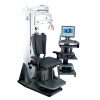
5 Interview Questions You Should Ask the Clinic Manager
Practice ManagementLooking for a new job can be a stressful experience, especially if you are between jobs and need to find something quickly. It’s important to balance the need to find any clinic that will hire you, with the desire to find one that fits your philosophy and skill set.
Earlier, we talked about key interview questions for hiring clinic managers to ask clinical job candidates. Now, let’s explore the clinician interview process from the candidate’s point of view.
Looking for a new job can be a stressful experience, especially if you are between jobs and need to find something quickly. It’s important to balance the need to find any clinic that will hire you, with the desire to find one that fits your philosophy and skill set. After all, if you land the right job at the right clinic, hopefully you won’t need to do any more job interviews for a long time! It’s well worth taking the extra time to research and weigh your preferences and options.
Start with what you want – and don’t want
Before going to an interview, give some thought to what you’re really looking for in your next job. What would you like to be doing for a new employer? Would you like to focus on sports therapy? Geriatrics? Hand therapy? Pediatrics? Some job postings may already list the focus of the position. If it’s not listed, or your specialty isn’t listed, don’t worry – you may still have something valuable to offer that clinic. With your unique skillset, the clinic could potentially expand its offering and add a new service. It’s worth discussing in the interview process to explore.
It’s just as important to think about what you DON’T want in your next job. Think about what activities or conditions are a deal-breaker. That way you will be able to respond to questions with some forethought, and not feel put on the spot with an unexpected question.
For example, if the hiring manager asks about your willingness to travel, you don’t want to look like you have been taken by surprise. If you think about your travel capabilities beforehand, you’ll be able to answer with confidence.
Remember, a job interview is a two-way conversation. It is a learning experience for both parties – The potential employer is learning about you by asking questions about your experience and skills with the goal of determining if you will fit into their organization. But it is also for you to interview them to determine if they will are the right fit for you.
More on questions for you to ask during an interview later. First, let’s talk about what you should (and should not) do to make a good impression at an interview. These simple but important preparation tips will go a long way to make you stand out.
Research the company
Visit their web site and/or social media pages to learn what the clinic offers, promotes, and specializes in. There is so much information there that will be very helpful to you during the interview. Is there a specific charity they support? Does the clinic have multiple locations? What is the current staffing? Do they use and promote any specialized equipment? Understanding the clinic’s mission and values may be the most important thing you can do to prepare yourself for an interview.
Arrive on time
You will have a set appointment, so make every effort to arrive early! Show respect for the person with whom you will be interviewing by not wasting their time. You may have spoken to them on the phone or via email; however the interview is where you will make your first impression. Offering an excuse for being late is simply letting them know you have poor planning skills. You may have the best résumé, however if you are late for your first meeting, you are starting off with a bad impression. Tipping the balance to a positive experience will be that much harder.
Look and act like a professional
In addition to your timeliness, your appearance and attitude will set the tone of the interview experience. Dress as a professional according to industry standards. If you visited the clinics web site and saw pictures of staff, do not dress to match them. Instead, bump your attire up to a level above what you saw in the pictures, but is still acceptable attire for the workplace.
If they typically wear khakis and a polo shirt, you should wear dress slacks and a more “business casual” attire. Do not wear jeans (or shorts) and a T-shirt! (Did I really have to say that?)
But, try not to over dress. Maybe that three-piece suit would be good if you were interviewing at a law firm, but it would be overdressing for a therapy clinic.
Use humor with caution
Also, be careful with interjections of humor. Jokes and witty comments can lighten the atmosphere, but you have to be careful, especially during your first contact. Think before you speak. If your comment, even if meant as humor, could be found offensive in any way, keep it to yourself! Not that you should avoid humor, but you should “read the room” and participate accordingly.
As mentioned earlier, an interview is a two-way conversation. The majority of the questions will be asked by the interviewer to learn more about you and your experience. But you need to learn about them as well! A good fit can only come about if both parties have an understanding of what the other is expecting for the position. So, here are a few questions you should ask when given the opportunity during the interview:
1. What do you enjoy the most (and least) about working for this company?
Most interviewers aren’t going to divulge too many frustrations about working for their company. But make note of anything they say, positive or negative. They may mention something you didn’t think to ask about, and you can follow up with more questions. Or you could comment on how some positive aspect fits in to what you’re looking for in your next company.
2. What is the average client-to-therapist ratio?
This interview question will help you learn the productivity requirements that will be expected. Different levels of productivity are appreciated by different people. Do you enjoy the challenges of working with a variety of clients throughout the day? Would you prefer a more focused atmosphere? Whatever your preference, you should find out how closely it aligns with this company’s normal workload.
3. What are the client populations this clinic focuses on?
You may learn this from your pre-interview research. Following up with questions in your discussion would also be a good idea. For example, if their web site identifies a focus on neuro rehab, spinal cord injuries, work related injuries, etc., you can ask about what special techniques they use or equipment they have that makes them stand out from the competition. You could also learn what certifications their current therapists have. And, you can mention if you have a relevant certification or specialty that you bring to the table.
4. What is the experience level of the current staff? What is the average time your current therapists have been employed with you?
It would be good to know if you would be working with seasoned veterans or recent grads. That way you can gauge how your experience fits in.
Knowing the average length of employment could tell you about the other employees’ job satisfaction. It’s usually a good sign if people stay with a company for a long time. If the average time on the job there is relatively short, you may want to ask yourself why would they have a lot of turn over?
5. How did this position become available?
Are they expanding their services? Did someone leave? Whatever the answer, you can use it to spin the discussion to how hiring you will help solve their issue.
Come prepared, be confident
Job interviews can be stressful, even uncomfortable if you are unprepared. However, if you are well prepared and have the confidence in your skills and what you can bring to the job, you’ll be better able to present yourself in the best light. Your confidence will be noticed. It could be the one thing that tips the job offer in your favor.




